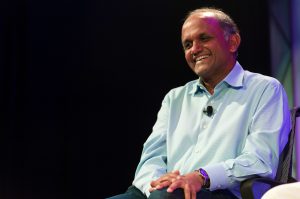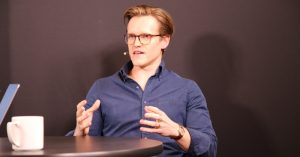Netflix Suffered Some Setbacks But its CEO Has a Plan
![]() Netflix is under a heaping mess right now. Earlier this year, they announced a price increase in their service, angering consumers. Then Netflix CEO Reed Hastings apologized for the lack of transparency in the company accompanied by the announcement that their DVD rental service will become a separate entity named Qwikster which resulted in soaring stocks. Less than a month later, they took it back, saying that the separation wouldn’t push through and their services will exist in one entity. This abrupt change in plans made investors question the future of the company, merely adding to the pile of concern over the streaming video service’s future.
Netflix is under a heaping mess right now. Earlier this year, they announced a price increase in their service, angering consumers. Then Netflix CEO Reed Hastings apologized for the lack of transparency in the company accompanied by the announcement that their DVD rental service will become a separate entity named Qwikster which resulted in soaring stocks. Less than a month later, they took it back, saying that the separation wouldn’t push through and their services will exist in one entity. This abrupt change in plans made investors question the future of the company, merely adding to the pile of concern over the streaming video service’s future.
Now, Netflix is in a bit of conundrum as they suffered loss of more than 800,000 subscribers. Netflix subscribers, from 24.6 million are down to 23.8 million as of September 30. This loss in subscribers caused their shares to plummet by 27% (or $826.83) during trading on Monday. Their shares in mid-July traded at $300. But their third quarter surpassed analysts’ expectations, as they reported an increase in their net income by 65% to $62.5 million, or $1.16 a share. Analysts projected only ¢99 per share.
“We became a symbol of the evil, greedy corporation,” Hastings said in a Monday interview with The Associated Press. “Then we faced a reputational hit that created significantly more cancellations than we anticipated.”
![]() Netflix will be launching in the UK by early 2012, with hopes that this would help boost the company’s revenue. But even before their launch, they already face a tough market as they will be in direct competition to BSkyB, Amazon’s LoveFilm and the BBC iPlayer, which will surely take a toll on their plan for UK domination.
Netflix will be launching in the UK by early 2012, with hopes that this would help boost the company’s revenue. But even before their launch, they already face a tough market as they will be in direct competition to BSkyB, Amazon’s LoveFilm and the BBC iPlayer, which will surely take a toll on their plan for UK domination.
“UK members will subscribe to Netflix and to other entertainment offerings,” said Hastings and financial officer David Wells in a joint letter. “We have to attract and retain subscribers efficiently enough to be able to generate a profit. While we normally target two years to profitability, with the increased competition in the UK relative to Canada, we anticipate it may take longer. We’ll know more after our first two quarters.”
Though Netflix’s future seems a bit bleak, Hastings has a backup plan: exclusivity. Before you take this out of context, what I mean by this is that they would be more like cable TV providers who offer exclusive movies or shows that you won’t be able to watch on other channels.
Hastings published a letter to Netflix shareholders explaining his plans for Netflix.
In television… the networks (ABC, FX, etc.) have long relied upon exclusive content to differentiate among themselves. As video moves online, so too has this practice of exclusive content. HBO has an exclusive license to recent Universal movies that includes its online HBO GO, for example. Netflix has signed exclusive licenses for DreamWorks Animation, for Relativity, and others. In episodic television, exclusives are also the norm. Netflix doesn’t license “Deadwood” from HBO because they see strategic value in keeping it exclusive. Netflix licenses “Mad Men” and “House of Cards” exclusively for much the same reason.
…We don’t have to “beat” Starz or other networks to succeed…We won’t have every movie or TV series; but we do provide enough value that consumers also want to subscribe to Netflix.
Any given consumer will have only one of DirecTV or Comcast, say, for their video service. That is classic either‐or competition. But with premium television networks like Netflix, the more good experiences there are, the more consumers are willing to spend to have multiple channels from which to get enjoyment.
This could be really beneficial for Netflix as well as subscribers. The only problem is, would their subscribers find their offering worth it? It’s another drastic shift in Netflix’s plans, emphasizing an industry that’s undergoing constant change. Whether Netflix will be able to position itself as the leader in streaming services remains to be seen, but it’s clear Hastings has big dreams for his company, looking to survive another iteration of technology and consumer demand.
A message from John Furrier, co-founder of SiliconANGLE:
Your vote of support is important to us and it helps us keep the content FREE.
One click below supports our mission to provide free, deep, and relevant content.
Join our community on YouTube
Join the community that includes more than 15,000 #CubeAlumni experts, including Amazon.com CEO Andy Jassy, Dell Technologies founder and CEO Michael Dell, Intel CEO Pat Gelsinger, and many more luminaries and experts.
THANK YOU









